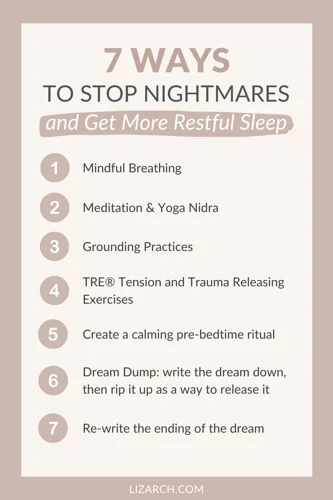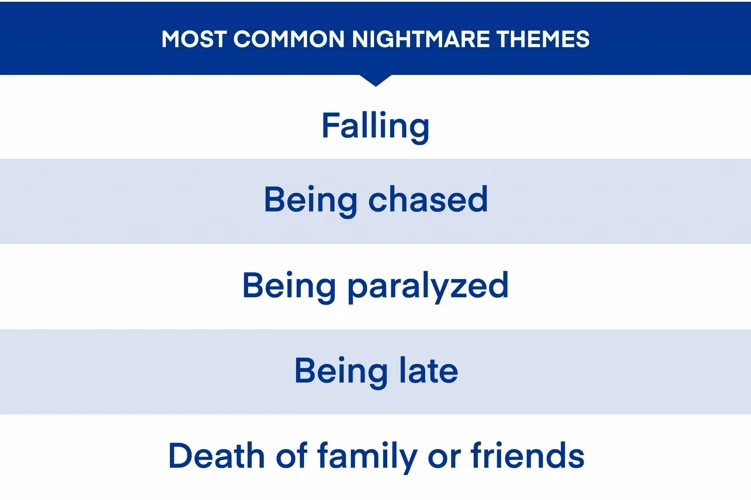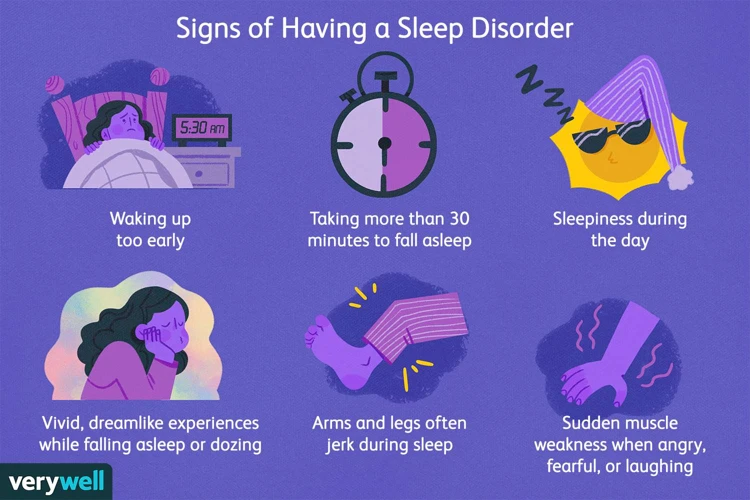Contents
- Introduction
- Creating a Bedtime Routine
- Create a Comfortable Sleep Environment
- Manage Stress and Anxiety
- Maintain a Healthy Lifestyle
- Address Underlying Medical Conditions
- Speak to Your Doctor
- Conclusion
-
Frequently Asked Questions
- How can a bedtime routine help reduce nightmares?
- Why is it important to avoid large meals before bedtime?
- What are some relaxation techniques that can help reduce nightmares?
- How can darkening the room help reduce nightmares?
- Why is it important to maintain a comfortable sleeping temperature?
- How can exercise help reduce nightmares?
- What is journaling and how can it help reduce nightmares?
- What is meditation and how can it help reduce nightmares?
- How can limiting screen time before bed help reduce nightmares?
- When should you seek medical help for nightmares?
- References
Introduction

When it comes to getting a good night’s sleep, nightmares can be a real hindrance. These vivid and often disturbing dreams can leave you feeling anxious and restless, and can even affect your overall mental and physical health. Fortunately, there are a number of practical tips you can follow to reduce the likelihood of nightmares and enjoy a more peaceful night’s sleep. From establishing a bedtime routine to managing stress and anxiety, we’ll explore a range of strategies to help you get the rest you need.
Why Do We Have Nightmares?
It is not uncommon to have a nightmare from time to time, but if they become frequent, they can have a negative impact on our mental health and overall well-being. Nightmares are vividly realistic, disturbing dreams that most often wake us up from deep sleep. They can leave us feeling anxious, afraid, and often disorientated upon awakening.
The reasons for nightmares are complex and varied. Some common causes of nightmares may include:
- Anxiety and Stress: Anxiety and stress can manifest in our dreams, and if left unchecked can lead to nightmares.
- Traumatic Experiences: Trauma can be a significant factor in nightmares, especially if we have suppressed memories that our unconscious mind is trying to process.
- Negative Emotions: Negative emotions such as fear, anger or sadness can play a role in causing nightmares.
- Substance Abuse: Certain substances like alcohol and drugs can interrupt the REM sleep cycle, leading to nightmares.
- Medical Conditions: Medical conditions like sleep apnea or other sleep disorders can cause nightmares as well.
It is important to address and manage the causes of nightmares to reduce their occurrence. With proper treatment and attention to our sleep habits, we can improve the quality of our sleep and reduce the likelihood of having nightmares.
Creating a Bedtime Routine

Establishing healthy bedtime habits is essential for maintaining a good night’s sleep. Creating a routine can help signal to your body that it’s time to wind down and prepare for rest. By doing so, you can reduce the likelihood of experiencing nightmares and wake up feeling refreshed. In this section, we’ll discuss some tips for creating a bedtime routine that works for you.
Stick to a Schedule
Maintaining a consistent sleep schedule can have a significant impact on reducing the likelihood of nightmares. Our bodies have a natural sleep-wake cycle known as the circadian rhythm, which works best when we stick to a regular routine. This means going to bed and waking up at the same time every day, including on weekends.
To help with this, it can be helpful to create a table that outlines your ideal sleep schedule. Include the time you plan to go to bed and wake up, as well as any activities you may do before bedtime (e.g., reading, meditation).
| Day of the week | Bedtime | Wake time | Bedtime activities |
|---|---|---|---|
| Monday | 10:00pm | 6:00am | Read for 20 minutes |
| Tuesday | 10:00pm | 6:00am | Do yoga for 10 minutes |
| Wednesday | 10:00pm | 6:00am | Listen to calming music for 15 minutes |
| Thursday | 10:00pm | 6:00am | Practice deep breathing for 10 minutes |
| Friday | 11:00pm | 7:00am | Read for 20 minutes |
| Saturday | 11:00pm | 7:00am | Do yoga for 10 minutes |
| Sunday | 10:00pm | 6:00am | Listen to calming music for 15 minutes |
Additionally, having a consistent sleep routine signals to our brain that it’s time to wind down and prepare for sleep, which can help reduce stress and anxiety. This, in turn, can reduce the incidence of nightmares. So, try to stick to a schedule as much as possible for a better night’s sleep.
Avoid Large Meals and Stimulants
It is recommended to avoid consuming large meals or stimulants before bedtime to reduce the likelihood of nightmares. Consuming heavy meals close to bedtime can lead to discomfort and indigestion, making it difficult to fall asleep. It is advisable to consume a light meal at least two to three hours before bedtime.
Additionally, substances such as caffeine, nicotine, and alcohol can have a stimulating effect on the body, making it difficult to fall asleep or causing disturbances during the sleep cycle. These substances can cause a decrease in the quality and quantity of sleep.
Here are some tips to help you avoid consuming large meals and stimulants before bedtime:
- Avoid consuming heavy or spicy foods before bedtime
- Choose foods that are high in protein and low in fat, such as lean meats or fish
- Limit your caffeine intake, especially in the late afternoon and evening
- Avoid nicotine before bedtime
- Avoid consuming alcohol before bedtime as it can disrupt the sleep cycle and lead to vivid dreams
By following these tips, you can help ensure that you get a better night’s sleep, which can lead to a reduction in the likelihood of nightmares.
Relaxation Techniques
Incorporating relaxation techniques into your bedtime routine can help reduce the likelihood of nightmares and promote peaceful sleep. Here are some techniques to consider:
- Breathing exercises: Deep breathing exercises can help calm your mind and body. Try inhaling slowly through your nose for four counts, holding your breath for seven counts, and exhaling through your mouth for eight counts.
- Progressive muscle relaxation: This involves tensing and then relaxing each muscle group in your body, one at a time. Starting with your toes, clench the muscle group for a few seconds, then release the tension and move on to the next muscle group.
- Visualization: Imagine a peaceful scene or scenario, such as lying on a beach or walking through a forest. Use all of your senses to create a vivid mental image.
- Guided meditation: Apps and websites offer a variety of guided meditations that can help calm your mind and body. Find one that works for you and practice it regularly.
By incorporating relaxation techniques into your bedtime routine, you may find that you fall asleep more easily and experience fewer nightmares.
Create a Comfortable Sleep Environment

As we spend a significant portion of our lives asleep, it’s important to create a comfortable and conducive environment for restorative sleep. Your sleep environment affects your quality of sleep, including the likelihood of experiencing nightmares. It’s essential to consider various factors such as the lighting, temperature, and beddings when creating a suitable sleep environment. Let’s explore some practical tips you can implement to make your sleeping space more comfortable.
Darken the Room
Creating a comfortable sleep environment is essential for reducing the likelihood of nightmares, and one key factor to consider is the amount of light in your bedroom. Darkening your room can improve the quality of your sleep, reduce disruptions, and lower the chances of experiencing nightmares. Here are some tips on how to do it:
- Invest in blackout curtains or shades: These can be a great investment to block out streetlights or early morning sunlight, creating a darker environment ideal for sleep.
- Use an eye mask: If you don’t want to invest in blackout curtains, an eye mask can also be a great option to block out light and create a darker environment.
- Turn off electronic devices: Electronic devices such as smartphones or televisions emit light that disrupts melatonin production, which can make it difficult to fall asleep and increase the likelihood of vivid dreams or nightmares. Turn them off at least an hour before bed.
- Minimize ambient light: Even small amounts of light from alarm clocks or nightlights can disrupt your sleep cycle. Keep your bedroom as dark as possible by covering these sources of ambient light or placing them in a drawer.
Taking these steps to darken your bedroom can help promote a restful night’s sleep and lower the chances of experiencing nightmares.
Adjust the Temperature
Adjusting the temperature of your bedroom can greatly impact the quality of your sleep, and therefore reduce the likelihood of nightmares. Different people have different preferences for sleeping conditions, but generally, the ideal temperature for a good night’s sleep is between 60 and 67 degrees Fahrenheit (15.6 to 19.4 degrees Celsius). This temperature range helps to regulate your body’s internal temperature, which is an essential component of a healthy and restful sleep experience.
There are various methods to adjust the temperature of your bedroom, and understanding these tips can help you find the optimal temperature for your comfort. Here are some useful tips to help you adjust your bedroom temperature:
| Tip | Description |
|---|---|
| Use a thermostat | A thermostat is an effective tool to maintain a consistent temperature in your bedroom. Set the thermostat to the desired temperature, and it will adjust the heating or cooling system as needed to maintain that temperature. |
| Use a fan or air conditioner | Using a fan or air conditioner is a great way to cool down your room, especially during hot summer nights. They also offer white noise, which can help to soothe your mind and promote relaxation. |
| Layer your bedding | Layering your bedding can help you adjust the temperature to your liking. Customize your bedding options for the optimal temperature based on your preferences. For instance, during colder nights, use thicker blankets and comforters, while during hotter nights, use light and breathable fabrics. |
| Wear appropriate clothing | Wear appropriate clothing to bed. Dress lightly during summer nights, and wear pajamas and socks during the winter season to keep your body warm and cozy. |
By utilizing these tips, you can adjust the temperature of your bedroom to create a comfortable sleeping environment that promotes restful and peaceful sleep experiences, thus reducing the likelihood of nightmares. It is important to note that finding your perfect sleeping temperature may take some time and experimentation, so be patient and persistent with your efforts.
Invest in a Comfortable Mattress and Pillows
One of the key factors that can help in reducing the likelihood of nightmares is investing in a comfortable mattress and pillows. When it comes to sleep quality, the quality of your mattress and pillows can make a significant difference.
A good mattress and pillows should provide proper support to your body, helping to alleviate any aches or pains that may be keeping you up at night. They should also be comfortable and cozy, helping you to feel relaxed and at ease as you drift off to sleep.
What to Look for in a Mattress: When you’re shopping for a new mattress, there are several factors to consider, including:
| Factor | Description |
| Support | Look for a mattress that provides the right level of support for your body weight and sleeping position. A mattress that is too firm or too soft can lead to discomfort and pain. |
| Comfort | Your mattress should feel comfortable and provide a sense of relaxation. This can be a personal preference, so it’s important to test out different types of mattresses to find the right fit for you. |
| Size | Choose a mattress that is appropriate for your body size and sleeping preferences. A mattress that is too small can make it difficult to get comfortable, while a mattress that is too large can be difficult to move and may take up too much space in your bedroom. |
| Durability | Invest in a high-quality mattress that is built to last. A good mattress should have a long lifespan and be able to withstand regular wear and tear. |
What to Look for in Pillows: When shopping for pillows, keep the following factors in mind:
| Factor | Description |
| Size | Choose a pillow that is appropriate for your sleeping position and head size. Side sleepers may prefer a thicker pillow, while back or stomach sleepers may need a flatter pillow. |
| Fill Material | Pillows can be filled with a variety of materials, including down, feathers, memory foam, and synthetic fibers. Consider your personal preferences and any allergies you may have before making your choice. |
| Firmness | Pillows can have varying levels of firmness, from soft to firm. Again, this is a personal preference and can depend on your sleeping position and neck support needs. |
| Care | Choose a pillow that is easy to clean and maintain. Some pillows may be machine washable, while others require dry cleaning or spot cleaning. |
By investing in a comfortable mattress and pillows that are suited to your needs, you can improve your sleep quality and reduce the likelihood of nightmares.
Manage Stress and Anxiety

Stress and anxiety can wreak havoc on our sleep, often leading to nightmares and a restless night. It’s crucial to manage these emotions effectively to minimize their effects. With various relaxation techniques and healthy habits, you can create a space of peace and calm before bed. Let’s explore some of the ways you can manage stress and reduce the likelihood of nightmares.
Exercise Regularly
Regular exercise can help reduce the likelihood of nightmares. Physical activity not only helps to tire out the body, but it can also have a positive impact on mental health. Studies have shown that exercise can improve sleep quality, reduce stress, and alleviate symptoms of anxiety and depression. Here are some tips for incorporating exercise into your routine:
| Tips for Exercising |
|---|
| 1. Choose an activity you enjoy, whether it’s running, swimming, dancing, or lifting weights |
| 2. Start with small goals and gradually increase intensity and duration |
| 3. Aim for at least 30 minutes of moderate exercise most days of the week |
| 4. If you don’t have time for a full workout, try incorporating short bursts of activity throughout your day, such as taking the stairs instead of the elevator or going for a brisk walk during your lunch break |
| 5. Don’t exercise too close to bedtime, as it can increase alertness and make it harder to fall asleep |
Remember, any amount of physical activity is better than none, so find an activity you enjoy and make it a part of your daily routine. It may take some time to notice the benefits, but regular exercise can help promote better sleep and overall well-being.
Journaling
Journaling is a powerful tool for managing stress and anxiety that can also help reduce the likelihood of nightmares. It involves writing down your thoughts and feelings in a journal, which can help provide clarity and perspective. Here are some tips for incorporating journaling into your bedtime routine:
- Schedule journaling time: Choose a specific time each evening to sit down and write in your journal. This can help make it a habit and part of your regular bedtime routine.
- Write freely: Don’t worry about grammar or spelling – simply write down whatever comes to mind. This can help release any pent-up emotions or thoughts that may be causing stress or anxiety.
- Focus on gratitude: Take some time to reflect on the positive aspects of your day and write about them. This can help shift your focus away from negative thoughts and promote more positive feelings.
- Identify triggers: Make note of anything that may have caused stress or anxiety throughout the day. This can help you identify patterns and develop strategies for managing these triggers in the future.
- Brainstorm solutions: If you’re dealing with a specific problem or issue, use your journal to brainstorm potential solutions. This can help you feel more in control and reduce feelings of helplessness.
Incorporating journaling into your bedtime routine can not only help reduce stress and anxiety, but also promote better sleep and reduce the likelihood of nightmares. It’s a simple yet effective strategy that can be easily incorporated into your daily routine.
Meditation
Meditation is a proven technique to reduce anxiety, stress, and negative thoughts. Practicing meditation before bed can help calm the mind and prepare for a restful night’s sleep. Here are some tips for incorporating meditation into your bedtime routine:
- Choose a quiet and comfortable space: Find a place where you won’t be disturbed and can sit or lie down comfortably. This could be a cozy corner in your room or a quiet space outside.
- Focus on your breath: Start by taking deep breaths and focusing your attention on the sensation of your breath moving in and out of your body. This helps regulate your breathing and release tension.
- Try a guided meditation: If you’re new to meditation, guided meditations can be helpful. There are several free apps available that offer guided meditations for different durations and goals.
- Visualize a peaceful scene: Imagine a calming scene, such as a beach or mountain top, and focus on the details. This can help shift your attention away from negative thoughts and towards a positive and peaceful mindset.
- Acknowledge and release thoughts: It’s natural for thoughts to arise during meditation. Acknowledge them without judgment and let them go. Bring your attention back to your breath or visualization.
Incorporating meditation into your bedtime routine takes practice and patience, but the benefits can be significant. By calming your mind and body before sleep, you can reduce the likelihood of nightmares and improve the quality of your sleep.
Maintain a Healthy Lifestyle

As we strive for a good night’s sleep, it’s important to remember that our lifestyle choices can greatly impact the quality of our sleep. Maintaining a healthy daily routine can make all the difference when it comes to reducing the likelihood of nightmares disrupting our rest. In this section, we’ll explore practical tips for implementing healthy habits that can promote better sleep and keep those unsettling dreams at bay.
Eat a Balanced Diet
A balanced diet plays a crucial role in our well-being, not just physically but mentally as well. Consuming a variety of nutrient-rich foods can help reduce the likelihood of nightmares. Here are some essential nutrients that should be a part of your diet along with the foods that are high in them.
| Nutrient | Food Sources |
|---|---|
| Iron | Spinach, lentils, beef, tofu, pumpkin seeds |
| Omega-3 Fatty Acids | Fatty fish, chia seeds, walnuts |
| Magnesium | Almonds, cashews, avocado, black beans, spinach |
| B Vitamins (B6, B9, B12) | Lentils, chickpeas, salmon, leafy greens, eggs, dairy products |
| Vitamin D | Fatty fish, eggs, fortified milk or cereal, mushrooms |
| Trytophan | Turkey, chicken, tofu, pumpkin seeds, almonds |
It’s important to note that a balanced diet isn’t just about consuming certain nutrients. It’s also about limiting your intake of processed foods, added sugars, and saturated fats. Incorporating more fresh fruits, vegetables, and whole grains into your diet can have a positive impact on your overall health and reduce the likelihood of nightmares.
Avoid Alcohol and Smoking
It’s essential to avoid alcohol and smoking if you want to reduce the likelihood of nightmares. Alcohol and smoking can negatively affect your sleep quality and quantity, leading to an increased risk of having nightmares during the night.
Alcohol: Drinking alcohol before bedtime can cause disruptions in your sleep cycle, leading to nightmares. Alcohol affects the REM (rapid eye movement) stage of sleep, which is crucial for the brain to process emotions and memories. When this stage is disrupted, it increases the likelihood of having nightmare episodes. Experts recommend avoiding alcoholic beverages at least four hours before bedtime.
Smoking: Smoking affects the body’s ability to get restful sleep, as it contains nicotine, which is a stimulant that increases brain activity. Smokers usually experience lighter sleep, and their REM stage is often affected, increasing the risk of having nightmares. Experts recommend quitting smoking to improve overall health, including sleep quality.
Here’s a table summarizing the negative effects of alcohol and smoking on sleep quality:
| Substance | Negative Effects on Sleep Quality |
|---|---|
| Alcohol | Disrupts REM stage of sleep, leading to an increased risk of nightmares |
| Smoking | Contains nicotine, a stimulant that increases brain activity and disrupts sleep quality |
Avoiding alcohol and smoking is crucial if you want to reduce the likelihood of nightmares. These substances negatively affect sleep quality and quantity, which may induce nightmare episodes during the night.
Limit Screen Time Before Bed
It is important to limit screen time before bed as exposure to electronic devices can interfere with our natural sleep-wake cycle. The blue light emitted by screens can suppress the production of the sleep hormone melatonin, making it harder to fall asleep and stay asleep. Engaging with stimulating content such as social media, video games or news can lead to an increase in stress levels and make your mind more alert just before bedtime.
To combat these issues, it is recommended to avoid using electronic devices for at least one hour before bedtime. Instead, consider engaging in relaxing and non-stimulating activities such as reading a book, taking a warm bath or practicing meditation.
Here are some additional tips to help limit screen time before bed:
| Tips | Explanation |
|---|---|
| Avoid TV in the Bedroom | Having a TV in the bedroom can lead to prolonged screen time and negatively affect sleep quality. Consider removing the TV from your sleeping space. |
| Set a Bedtime Alarm | Using an alarm can help remind you to turn off electronic devices and start your bedtime routine. |
| Use Night Shift Mode | Night Shift mode on iPhones and iPads can reduce the amount of blue light emitted by the screen, promoting better sleep. |
| Charge Devices Outside the Bedroom | Charging electronic devices outside the bedroom can help reduce temptation to use them before bed and limit screen time. |
By following these tips and reducing screen time before bed, you can help promote better sleep and reduce the likelihood of nightmares.
Address Underlying Medical Conditions

Your mental and physical health can have a significant impact on your quality of sleep. If you find that you’re experiencing frequent nightmares, it’s important to address any underlying medical conditions that might be contributing to the problem. This could include mental health disorders such as anxiety and depression, as well as sleep disorders like sleep apnea or restless leg syndrome. In this section of the article, we’ll explore some strategies for identifying and addressing these conditions.
Counseling or Therapy
Counseling or therapy is a crucial step towards addressing underlying psychological issues that may contribute to nightmares. Seeking help from a mental health professional can make a huge difference in managing stress and anxiety, which are major triggers for nightmares. Through counseling or therapy, you can learn effective coping mechanisms and strategies to help identify and manage stressful situations that may lead to nightmares.
Some forms of therapy that may be helpful include:
- Cognitive Behavioral Therapy (CBT): This form of therapy has been shown to be effective in treating anxiety and trauma-related disorders that often contribute to nightmares. CBT helps patients to identify negative thought patterns and behaviors, and provides tools for managing these patterns.
- Eye Movement Desensitization and Reprocessing (EMDR): EMDR is a specialized therapy that helps individuals to process past traumatic events that may be contributing to nightmares. The technique involves a series of eye movements while discussing past events, which has been shown to reduce the distress associated with these events.
- Exposure Therapy: This form of therapy involves gradually exposing individuals to the source of their anxiety, in a safe and controlled environment. This helps to desensitize individuals to the trigger, reducing anxiety and the likelihood of nightmares.
Speaking to a mental health professional can provide valuable insights and coping mechanisms to address underlying issues that may be contributing to nightmares. The therapeutic techniques and strategies learned in counseling or therapy can also improve overall mental health and well-being.
Treatment for Sleep Disorders
Sleep disorders can greatly increase the likelihood of nightmares. Treatment for such disorders is crucial in helping to reduce the frequency of nightmares. There are various types of sleep disorders that one may experience, such as insomnia, sleep apnea, or restless leg syndrome. Each of these disorders has its own treatment options.
Insomnia: This disorder can be treated through medication, such as sleeping pills, or through behavioral therapies, such as stimulus control therapy or sleep restriction therapy. Stimulus control therapy helps individuals associate the bed with sleep by limiting the time spent in bed while awake. Sleep restriction therapy aims to limit the amount of time one spends in bed to help improve the quality of sleep.
Sleep apnea: Treatment options for sleep apnea include continuous positive airway pressure (CPAP) therapy, which involves wearing a mask that delivers a continuous flow of air to keep the airway open during sleep. Other options include oral appliances, positional therapy, or in some cases, surgery.
Restless leg syndrome: This disorder can be treated using medication such as dopaminergic agents or iron supplements. Alternative treatments include massage therapy, leg compression, or doing leg exercises.
It’s important to address any underlying sleep disorders with a medical professional to ensure the best course of treatment is taken. Treating sleep disorders not only reduces the likelihood of experiencing nightmares, but also helps improve overall sleep quality and daily functioning.
| Sleep Disorder | Treatment Options |
|---|---|
| Insomnia |
Medication with sleeping pills Stimulus control therapy Sleep restriction therapy |
| Sleep apnea |
Continuous positive airway pressure (CPAP) therapy Oral appliances Positional therapy Surgery |
| Restless leg syndrome |
Dopaminergic agents Iron supplements Massage therapy Leg compression Leg exercises |
Speak to Your Doctor
If you have tried implementing various tips and strategies for reducing the likelihood of nightmares but still find yourself having them regularly, it may be time to speak to a medical professional. It’s important to be proactive about your sleep health and discuss any persistent issues with your doctor. They can help identify any underlying medical conditions that may be contributing to your nightmares and provide guidance on appropriate treatment options. Don’t hesitate to reach out for help if you need it. Your well-being is worth prioritizing.
When to Seek Medical Help
If your nightmares persist despite implementing the practical tips mentioned above, it may be time to seek medical help. Below are some warning signs that suggest it’s time to consult a healthcare professional:
| Warning Signs | Action Needed |
|---|---|
| Frequent Nightmares | If you have nightmares more than once a week, seek medical help. This could be a sign of an underlying sleep disorder or a mental health condition. |
| Disturbed Sleep | If your nightmares are so severe that they are affecting your sleep quality and causing daytime fatigue, it’s time to see a healthcare professional. |
| Daytime Distress | If your nightmares are causing significant distress and anxiety during the day, it’s essential to seek medical help. |
| Changes in Behavior | If you notice changes in your behavior such as avoiding going to bed or experiencing fear of falling asleep, it’s time to see a healthcare professional. |
| Underlying Medical Condition | If your nightmares are a symptom of an underlying medical condition such as PTSD, it’s essential to seek medical help to address both the condition and the nightmares. |
It’s important not to ignore the warning signs and to take action as soon as possible to address the issue. Your healthcare professional may recommend therapy, medication, or other treatment options to help you reduce the frequency and intensity of your nightmares.
Conclusion
After implementing the 10 practical tips mentioned in this article, you should be able to have a peaceful and nightmare-free sleep. Starting with creating a bedtime routine and sticking to a schedule, you can train your body to regulate sleep and wake up times. This can help mitigate the chances of having nightmares. You should also avoid large meals, caffeine, and other stimulants before bed, as they can interfere with the quality of sleep and increase the likelihood of nightmares.
In addition to creating the right sleep environment with comfortable beds, pillows, a dark room, and the right temperature, managing stress and anxiety is essential. Regular exercise, journaling, and meditation are effective stress-reducing techniques that promote better sleep.
Maintaining a healthy lifestyle by eating a balanced diet, limiting alcohol and smoking, and reducing screen time before bed can also help prevent nightmares. It is important to address any underlying medical conditions that may be contributing to your nightmares. Counseling or therapy and treatment for sleep disorders may be necessary to ensure good sleep health.
If despite all the efforts, you still suffer from recurring nightmares, it may be time to seek medical help. Speak to your doctor and describe your symptoms in detail. They can help determine if there is an underlying condition that may require further treatment.
In conclusion, by making these lifestyle modifications and seeking help when needed, you can significantly reduce the likelihood of nightmares and improve the quality of your sleep. A good night’s sleep is crucial for your physical and mental health, helping you wake up feeling rested and refreshed every morning.
Frequently Asked Questions
How can a bedtime routine help reduce nightmares?
A consistent and calming bedtime routine can help signal to the body that it is time to wind down and prepare for sleep, reducing the likelihood of nightmares.
Why is it important to avoid large meals before bedtime?
Large meals before bedtime can cause indigestion and discomfort, which can disrupt sleep and increase the likelihood of nightmares.
What are some relaxation techniques that can help reduce nightmares?
Deep breathing, progressive muscle relaxation, and visualization exercises can all help induce a state of relaxation and reduce stress, which can lead to fewer nightmares.
How can darkening the room help reduce nightmares?
A dark room can help signal to the body that it is time to sleep and reduce disturbances that can lead to nightmares.
Why is it important to maintain a comfortable sleeping temperature?
A comfortable sleeping temperature can help ensure restful sleep and reduce the likelihood of nightmares caused by discomfort or overheating.
How can exercise help reduce nightmares?
Regular exercise can help reduce stress and anxiety, which are common triggers for nightmares.
What is journaling and how can it help reduce nightmares?
Journaling involves writing down your thoughts and feelings and can be a helpful tool for processing emotions and reducing stress and anxiety, which can lead to fewer nightmares.
What is meditation and how can it help reduce nightmares?
Meditation involves focusing on the present moment and can help reduce stress and anxiety, which can contribute to nightmares.
How can limiting screen time before bed help reduce nightmares?
The blue light emitted by electronic devices can interfere with the body’s natural sleep cycle, making it harder to fall asleep and increasing the likelihood of nightmares. Limiting screen time before bed can help mitigate these effects.
When should you seek medical help for nightmares?
If nightmares are causing significant distress or impairing your ability to function during the day, it may be time to speak to a doctor or mental health professional to address any underlying issues.







